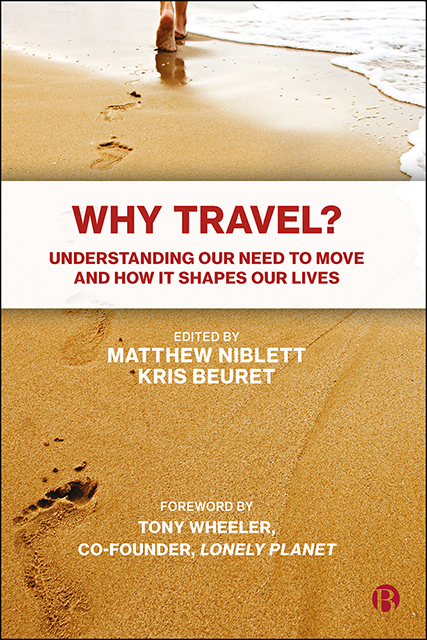Book contents
9 - Why People Travel: An Anthropological View
Published online by Cambridge University Press: 21 April 2023
Summary
Foundations
Why do humans travel? What are the motivations behind this fundamental behaviour? These are questions that have been explored in various guises within a wide range of anthropological studies, from early analyses of ancient myths to ethnographies of both traditional and contemporary peoples (cf Selwyn, 2018). An anthropological approach, for the purposes of this chapter, entails the examination of cases from many different cultures (spread temporally and geographically) in order to draw insights, both specific and general, to understand better why humans travel.
There is an overall assumption underpinning the chapter, namely that a good way to approach the subject of why people travel from an anthropological point of view is to build upon two foundations: ethnography and myth. We need, in other words, to base our generalizations on solid empirical observation and description, on the one hand, awareness of directly and/ or indirectly associated symbolism, imagery, fantasy and myth, on the other. In what follows, therefore, the intention is to present a blend of the ethnographic and mythological. Both speak to different aspects of reality while both are closely intertwined and interrelated.
In case of doubt or scepticism about the place of myth, fantasy, and so on in our scheme of things, Roland Dufour's (1977) proposal might be helpful:
According to the humanities, the myth is neither falsity, nor fable, nor fiction. If the ‘logos’ is reasoning, the ‘mythos’ is the irrational part of human thought. Myth is neither pure imagination nor pure intellect, but a faculty for intuitive grasping of invisible, even sacred and transcendent realities. Nestled in the collective unconscious, the myth is beyond history.
The point being that if we want to get into ‘motivation’ of why people travel there are various ways to do it – including looking into the unconscious motivations revealed in myth.
The examples that follow in this chapter are therefore taken both from myths and from ethnographies, but there is also another form of example: writings about travel. An intermediate form between ethnography and myth, these describe actual travels, but reveal through their presentation unconscious motivations and ideas about travel.
For all of these types of study material, we have a wide range of examples to choose from for our purposes. A great number of myths have travel as a central motif and travel writings have been a popular literary form for centuries (see Chapter 8 ‘Travel in Art and Literature’).
- Type
- Chapter
- Information
- Why Travel?Understanding Our Need to Move and How It Shapes Our Lives, pp. 163 - 184Publisher: Bristol University PressPrint publication year: 2021



